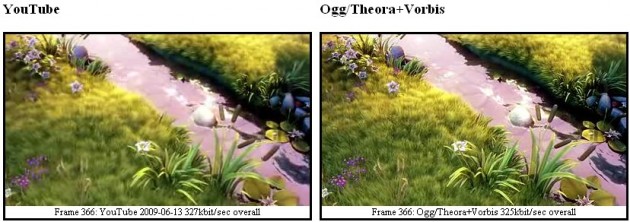
With YouTube and other video sites serving up over a billion streams a day, it’s beyond contention that web-based video is not only mainstream, but has become fundamental to the web experience. Why, then, is a huge majority of web video in a wrapped in a proprietary Flash candy coating — essentially making Adobe the gatekeeper of video content? It’s worked okay so far, but it’s hardly a fertile ground for innovation, not to mention the fact that Flash is a real dog on OS X and any kind mobile browser (if it’s even supported).
The next iteration of HTML standards is poised to introduce a <video> standard, putting moving images in the same natively-viewed category as images and text. Flash video has become so ubiquitous that you hardly think about it, but we all get a reminder every few months or so when we have to upgrade or re-install the plug-in, and the continuing difficulties with .flv support offline show that Flash is far from the ideal delivery method for such a (now) basic resource.
Unfortunate, it seems that the powers that be (heavyweights Apple, Mozilla, Microsoft, Google, &c.) can’t agree on what format the <video> tag will indicate. The battle is between the reigning champ, H.264, and the open-source alternative, Ogg Theora.
Whatever, let the format geeks work it out, right? I’m afraid not: there’s more than image quality and codec efficiency on the table here. H.264 is a property of the MPEG standards organization, which places it somewhere east of proprietary but west of public. Whatever its status is (I don’t pretend to understand exactly), it’s not free, and although it’s well-maintained and extremely common, many think that implementing a patented technology for a fundamental standard is a bad idea when there is an alternative.
And that alternative is Ogg Theora. While the Ogg formats (maintained by Xiph.org) haven’t taken off in popularity when compared to their MPEG cousins, they’re competitive and have the very attractive quality of being free and open source. Recent statements by Google’s __ suggesting that Theora is simply not efficient enough have been challenged, although it seems to me that there would certainly have to be some work done if Ogg were to roll out its format as a standard on this scale. Dailymotion has a corner of its site (you’ll need a compatible browser like FF 3.5) dedicated to using HTML5 and the <video> tag, but they admit that neither the audio nor image is up to snuff quite yet. It’s worth mentioning that The Video Bay is dual-wielding HTML5 and Theora as well, but to say its future is uncertain would be somewhat of an understatement.
Not easy, is it? Damned if you do, damned if you don’t. The devil you know or the devil you don’t know… and you have to pay for the devil you know. Plus, of course, I’m simplifying everything to my own level — and I’m decidedly not a developer. Personally I’m rooting for an open format (I suppose x264 is out because it relies too much on H.264), and I’m sure a little elbow grease would shine Theora up but good. I’m also unsure as to the possibility of supporting multiple formats, as the <img> tag and others obviously do (I may be missing something here).
Last, who’s to say that competition would be bad? You’ve got your open standard, free to all, and you’ve got your (perhaps slightly better) closed standard, easier to use and with better support. Fight! As long as it’s transparent to the user and it doesn’t stifle innovation, that sounds like the kind of rumble I can get behind.
This isn’t really a new battle, nor is it likely to be resolved any time soon, but discussion is ongoing elsewhere on the internet (such as at Ars’ excellent examination of the legal issues, and of course Reddit) and we may as well bring on over to the Crunch (again). Any codec nerds or patent-mongers care to chime in?
